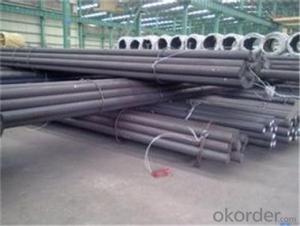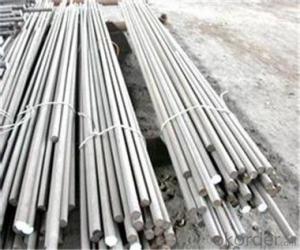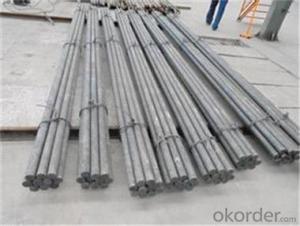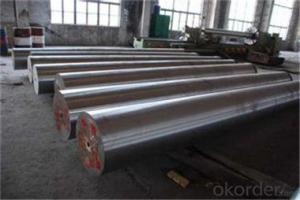Hard Chrome Carbon Steel Round Bar with Good Quality CNBM
- Loading Port:
- Tianjin
- Payment Terms:
- TT OR LC
- Min Order Qty:
- 990 m.t.
- Supply Capability:
- 2000000 m.t./month
OKorder Service Pledge
OKorder Financial Service
You Might Also Like
Description of steel round bar:
1.Diameter 80 to 800 mm
2.Black or Bright surface
3.Annealed or Quenched and tempered provided
4.Cutting service provide
Festures of steel round bar:
4340 Forged Round Steel Bar
1.Dia 80-800mm Length:2000-13000mm or as required
2.Technique:Forged
3.Delivery Time:45 days
Specifications of steel round bar:
Description |
Carbon Steel Rod/Carbon Steel Bar,carbon steel rod,carbon steel shaft,mild steel bar, mild steel shaft,ms bar | |
Material | ASTM | 1005,1006,1008,1010,1015,1020,1025,1030,1035,1040,1045,1050,1055,1060,1065,1070,1080,1084, 1016,1022 |
DIN | Ck10,Ck15,Ck22,Ck25,Ck30,Ck35,Ck40,Ck45,Ck50, 30Mn4,40Mn4 | |
BS | 040A04,095M15,045M10,080A40,045M10,080M50 | |
Standard | GB/T799,ASTM A29,A108,A321,A575,BS970,DIN1652,JIS G4051 | |
Section shape |
Round | |
Length |
As your required | |
Application | Carbon steel rod applies to chemical industry, shipping industry, manufacturing industry,construction,decorate Industry,electric power, pump shafts, sanitary wares,furniture handles,boiler,high temperature resistant,low temperature resistant, corrosion resistant. | |
Images of steel round bar:
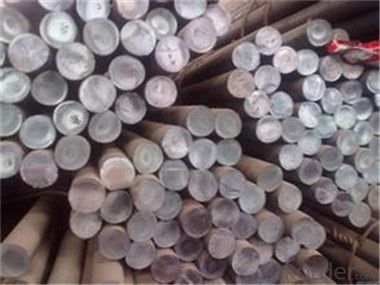
FAQ:
1. What is your package?
Packing situation: standard seaworthy packing or as customer required.
2. How long is the lead time?
Delivery time: 45 days after order confirmed.
3. What payment term do you accept?
Payment: T/T or L/C at sight.
- Q:Are steel round bars suitable for the production of hydraulic cylinders?
- Yes, steel round bars are suitable for the production of hydraulic cylinders. Steel is a material known for its strength, durability, and resistance to corrosion, making it an excellent choice for hydraulic applications. Steel round bars are often used in the construction of hydraulic cylinders due to their high tensile strength and ability to withstand heavy loads and pressure. Additionally, steel can be easily machined and welded, allowing for precise manufacturing and customization of hydraulic cylinders. Overall, steel round bars provide the necessary qualities and performance required for the production of hydraulic cylinders.
- Q:What are the different surface defects that can occur in steel round bars?
- Steel round bars can experience various surface defects, which can be categorized based on their appearance and severity. Some common defects include: 1. Scale: During the manufacturing process, a thin layer of oxide, known as scale, can form on the steel's surface. It appears rough and flaky and can be easily removed mechanically. 2. Pits: Small depressions or craters, caused by corrosion or mechanical damage, can occur on the steel's surface. Pits weaken the steel's structural integrity and may require repair or replacement. 3. Scratches: Shallow grooves or cuts, resulting from handling, transportation, or machining, can be found on the steel's surface. While minor scratches may not impact performance, deep scratches can cause stress concentration and potential failure. 4. Roll marks: Raised or depressed lines or patterns, formed during the rolling process, can be seen on the steel's surface. Uneven pressure distribution between rolls causes these marks, affecting dimensional accuracy and surface quality. 5. Laminations: Thin layers or bands of non-metallic inclusions parallel to the steel's surface, caused by inadequate refining or improper casting techniques, are known as laminations. They reduce strength and toughness, requiring further processing or rejection. 6. Decarburization: The loss of carbon content on the steel's surface, occurring during heating, annealing, or hot working, is referred to as decarburization. It decreases hardness and strength, potentially leading to premature failure. 7. Surface cracks: Visible cracks on the steel's surface, caused by excessive cooling rates, improper heat treatment, or mechanical stress, are surface cracks. They compromise structural integrity and may necessitate repairs or rejection. These examples cover just a few of the possible surface defects in steel round bars. It is crucial to inspect and address these defects to ensure the steel's quality and performance in various applications.
- Q:Can steel round bars be used in the manufacturing of appliances?
- Yes, steel round bars can be used in the manufacturing of appliances. Steel is a durable and versatile material that can be shaped into different forms, including round bars, which can be used for various purposes in appliance manufacturing such as structural support, handles, or components.
- Q:How do you prevent warping during welding of steel round bars?
- To prevent warping during welding of steel round bars, several measures can be taken. Firstly, it is crucial to ensure proper fit-up and alignment of the bars before welding, as any misalignment can lead to distortion. Secondly, using an appropriate welding technique, such as back-stepping or stitch welding, can help distribute heat evenly and minimize warping. Additionally, controlling the heat input and avoiding excessive heat buildup by using intermittent welding or preheating can also prevent distortion. Lastly, the use of clamps, fixtures, or tack welds to secure the bars in place during welding can provide stability and reduce the chances of warping.
- Q:How are steel round bars used in the construction of offshore structures?
- Steel round bars are commonly used in the construction of offshore structures due to their high strength and durability. These bars are often used as reinforcement in concrete structures, providing added strength and stability to the overall framework. Additionally, they can be used as support beams and columns, ensuring the structural integrity of offshore platforms, oil rigs, and other marine infrastructure. The corrosion-resistant properties of steel further make it an ideal choice for withstanding harsh marine environments.
- Q:What are the different types of steel round bars used in the defense industry?
- In the defense industry, various steel round bars are commonly employed due to their strength, durability, and ability to withstand harsh conditions. Some of the frequently utilized types are as follows: 1. High-strength low-alloy (HSLA) steel round bars: These bars possess a high strength-to-weight ratio, making them ideal for applications where weight reduction is crucial. They find extensive use in the construction of armored vehicles, tanks, and other military equipment. 2. Stainless steel round bars: Stainless steel exhibits remarkable resistance to corrosion and rust, making it an excellent choice for defense applications exposed to moisture or harsh environments. Its wide usage includes the manufacturing of military aircraft, naval vessels, and firearms. 3. Carbon steel round bars: Carbon steel is a versatile and cost-effective material extensively used in the defense industry. It offers excellent strength and hardness, making it suitable for various applications, such as missile components, gun barrels, and armor plates. 4. Alloy steel round bars: Alloy steel is a blend of different metals, typically including chromium, molybdenum, and nickel, which enhances its mechanical properties. It finds common application in the production of military-grade vehicles, artillery systems, and munitions. 5. Tool steel round bars: Tool steel is specifically designed to possess exceptional hardness, wear resistance, and toughness. It is often employed in the manufacturing of cutting tools, drills, and other equipment utilized in the defense industry. Each type of steel round bar possesses unique properties and advantages, enabling it to meet specific requirements within the defense sector. The selection of the appropriate steel round bar depends on the specific application and the desired performance characteristics needed to meet the demands of the defense industry.
- Q:Is HRB335 round steel or rib steel?
- H, R, and B are the first letters in English for hot-rolled (Hotrolled), ribbed (Ribbed) and reinforced (Bars) three words.The numbers behind HRB represent the mechanical properties of the material they produce. The specific value is the yield strength of the material, sigma S (or Sigma P0.2). HRB335, indicating rebar with a yield strength of 335MPa.
- Q:What is round steel?
- Round steel is a solid strip of steel whose cross section is round. Its specifications are expressed as millimeters in diameter. For example, "50" means a round steel with a diameter of 50 millimetersRound bar is divided into three kinds of hot rolling, forging and cold drawing. The specification of hot rolled round bar is 5.5-250 millimeters. Among them, 5.5-25 rounds of small round bars are mostly supplied by straight strips. They are commonly used as reinforcing bars, bolts and various mechanical parts;
- Q:Are steel round bars suitable for the production of bearings?
- No, steel round bars are not suitable for the production of bearings. Bearings require materials that have specific properties such as high hardness, wear resistance, and low friction coefficient. Steel round bars do not possess these characteristics in their natural state and would need additional processing and treatments to acquire the necessary properties for bearing production. Bearing materials are typically selected from alloys such as stainless steel, chrome steel, or ceramic materials that are specifically engineered to withstand the demanding conditions and provide optimal performance.
- Q:What are the advantages of using corrosion-resistant steel round bars?
- Using corrosion-resistant steel round bars offers numerous benefits. Firstly, these bars possess a high resistance to corrosion, enabling them to withstand exposure to moisture, chemicals, and other corrosive elements without experiencing significant damage. This makes them ideal for use in environments where the risk of corrosion is high, such as coastal areas or industrial settings. Secondly, corrosion-resistant steel round bars have a longer lifespan compared to regular steel bars. Their ability to resist corrosion ensures that they maintain their structural integrity and strength over time, reducing the need for frequent replacements. This not only saves costs but also minimizes the downtime associated with maintenance and repairs. Furthermore, the utilization of corrosion-resistant steel round bars enhances safety. When steel bars corrode, they can weaken and eventually fail, posing a risk to buildings, infrastructure, and even human lives. By employing corrosion-resistant steel round bars, the risk of structural failures due to corrosion is significantly reduced, ensuring the safety of individuals and property. In addition, corrosion-resistant steel round bars offer versatility in design and application. These bars can be easily fabricated and shaped into various configurations, making them suitable for a wide range of construction projects. They can be utilized in the construction of bridges, buildings, marine structures, pipelines, and many other applications where corrosion resistance is crucial. Lastly, corrosion-resistant steel round bars contribute to environmental sustainability. The longer lifespan of these bars decreases the need for frequent replacements, consequently reducing the demand for raw materials and minimizing waste. Furthermore, their resistance to corrosion results in less maintenance and repair work, leading to lower energy consumption and fewer carbon emissions. In conclusion, the advantages of using corrosion-resistant steel round bars include their resistance to corrosion, extended lifespan, enhanced safety, versatility in design, and positive environmental impact. These qualities make them a cost-effective and dependable choice for various construction and infrastructure projects.
1. Manufacturer Overview |
|
|---|---|
| Location | |
| Year Established | |
| Annual Output Value | |
| Main Markets | |
| Company Certifications | |
2. Manufacturer Certificates |
|
|---|---|
| a) Certification Name | |
| Range | |
| Reference | |
| Validity Period | |
3. Manufacturer Capability |
|
|---|---|
| a)Trade Capacity | |
| Nearest Port | |
| Export Percentage | |
| No.of Employees in Trade Department | |
| Language Spoken: | |
| b)Factory Information | |
| Factory Size: | |
| No. of Production Lines | |
| Contract Manufacturing | |
| Product Price Range | |
Send your message to us
Hard Chrome Carbon Steel Round Bar with Good Quality CNBM
- Loading Port:
- Tianjin
- Payment Terms:
- TT OR LC
- Min Order Qty:
- 990 m.t.
- Supply Capability:
- 2000000 m.t./month
OKorder Service Pledge
OKorder Financial Service
Similar products
New products
Hot products
Related keywords
